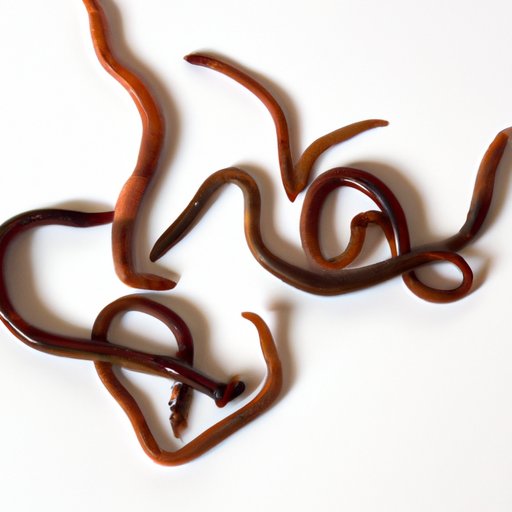
Introduction
Worms are parasites that live inside the human body and feed on nutrients. They can cause severe health problems and affect anyone at any age, particularly children and those who live or travel to areas with poor sanitation. Anyone can be infected with worms and they can cause a wide range of symptoms and illnesses. It’s important to understand how to get rid of worms in humans and how to prevent them from coming back. In this article, we will explore the causes and symptoms of human worm infestations, along with methods to treat them effectively.
Preventive Measures
The best way to avoid getting worms is to be aware of the risks and take preventive measures. Here are some steps you can take to reduce the risk of worm infestations:
The Importance of Good Hygiene Practices
One of the most effective preventive measures is to practice good hygiene. Make sure to wash your hands frequently, especially before eating, after using the bathroom, and after handling pets or soil. Teach children the importance of hygiene practices at a young age.
Avoiding Contaminated Food and Sources of Infection
Worms can be found in food, water, and soil. Make sure to cook your food thoroughly and avoid eating raw or undercooked meat, fish, and eggs. Avoid drinking untreated water or water from a questionable source.
Other Preventive Measures
Wear shoes to prevent worm larvae from entering through your feet. Wash your fruits and vegetables properly before eating. If you are traveling to an area with a risk of worm infestations, take extra precautions, such as using mosquito nets, or wearing clothing that covers your skin.
Dietary Changes to Eliminate Worms
The food you eat can have a significant impact on how your body responds to worms and how effectively it can eliminate them. Here are some dietary changes that may help:
Including Probiotic-Rich Foods in Your Diet
Probiotics are live bacteria and yeasts that are good for your digestive system. They can help your body naturally fight off infections and eliminate worms. You can get probiotics from fermented foods like yogurt, kimchi, and sauerkraut.
Eating Foods High in Fiber to Promote Bowel Movements
Eating fiber-rich foods like fruits, vegetables, and whole grains can help move food through your digestive system faster. This can reduce the amount of time that worms have to settle in one place and help eliminate them more quickly.
Other Foods and Supplements That May Be Helpful
Garlic, onions, and pumpkin seeds have been known to have natural antiparasitic properties. You can also take herbal supplements like black walnut, wormwood, and cloves to help eliminate worms. However, the effectiveness of these supplements varies, and it’s best to talk to a healthcare provider before taking them.
Types of Medicine for Treating Worm Infestations
If dietary changes and preventive measures do not eliminate worms, you may need to seek medical treatment. Here are some types of medicine that may be prescribed by healthcare providers:
Overview of the Different Types of Medicine Available
There are several types of medicine available to treat worm infestations. These include anthelmintic drugs, antiparasitics, and anti-inflammatory drugs.
How Each Type of Medicine Works and Associated Side-Effects
Anthelmintic drugs work by paralyzing the worms and making them easier for the body to eliminate. Anti-parasitics work by killing the worms and preventing them from multiplying. Anti-inflammatory drugs can help reduce inflammation and discomfort associated with worm infestations. Side-effects of these medicines can vary depending on the type of medicine and the individual’s response. Common side-effects include nausea, vomiting, and diarrhea.
The Pros and Cons of Alternative Medicine and Herbal Remedies
Alternative medicine and herbal remedies have been used for centuries as a way of treating worm infestations. However, it’s important to note that their effectiveness varies, and their use should be discussed with a healthcare provider. Some herbal remedies can interact with other medications and supplements, and others can be harmful when taken in high doses.
Caring for Someone with Worms
If someone in your household has been diagnosed with worms or you suspect they may have them, here are some ways to care for them:
Preventing the Spread of Infection
Make sure the infected person washes their hands frequently, especially after using the bathroom. Encourage others in the household to practice good hygiene practices as well. Avoid sharing towels, bedding, or clothing with the infected person.
Washing Bedding, Clothing, and Towels Regularly
Wash all bedding, clothing, and towels in hot water to kill any worms that may be present. Vacuum carpets and clean surfaces regularly to eliminate any worm eggs that may be present.
Other Tips and Considerations
Encourage the infected person to drink plenty of water and take any prescribed medicine as directed. Make sure to keep the infected person’s fingernails short to avoid the risk of them scratching themselves and spreading eggs to other surfaces.
Maintaining Overall Health and Hygiene
Preventing worm infestations is not just about taking measures to eliminate worms; it’s also about maintaining overall health and hygiene. Here are some tips:
Importance of Sleep, Hydration, and Exercise
Sleep, hydration, and exercise are vital to overall health and can help your body naturally fight off infections. Make sure to get plenty of rest, drink plenty of water, and exercise regularly.
Other Tips and Considerations
If you work in an environment where you may come into contact with people who have worms, make sure to take extra precautions. Wear gloves and wash your hands frequently. When traveling, be aware of the risks and take appropriate measures to avoid exposure to worms and other parasites.
Conclusion
Worm infestations can be a serious health problem, but there are steps you can take to prevent them. Practicing good hygiene, making dietary changes, and seeking medical treatment can help eliminate worms. It’s important to take preventive measures and maintain overall health and hygiene to avoid the recurrence of worm infestations. Always seek medical advice if you suspect you or someone in your household may have worms.





